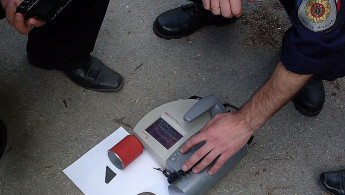Criminal gangs 'try to sell nuclear material to IS'
Criminal networks with suspected ties to Russia have been caught trying to sell nuclear material to Islamic State group extremists, according to an investigation by AP.
These groups have made at least four attempts in the past five years to sell radioactive material to extremists through Moldova, according to the news agency.
One investigation uncovered an attempt to sell bomb-grade uranium to a real buyer from the Middle East, the first known case of its kind.
In wiretaps, videotaped arrests, photographs of bomb-grade material, documents and interviews, AP found that smugglers were explicitly targeting buyers deemed enemies of the West.
The developments represent the fulfillment of a long-feared scenario in which organised crime gangs are trying to link up with groups such as Islamic State and al-Qaeda - both of which have made clear their ambition to use weapons of mass destruction.
The sting operations involved a partnership between the FBI and a small group of Moldovan investigators, who over five years went from near total ignorance of the black market to wrapping up four sting operations.
| A thriving nuclear black market has emerged in an impoverished corner of Eastern Europe. |
Informants and police posing as connected gangsters penetrated the smuggling networks, using old-fashioned undercover tactics as well as high-tech gear from radiation detectors to clothing threaded with recording devices.
For strategic reasons, in most of the operations arrests were made after samples of nuclear material had been obtained rather than the larger quantities. That means that if smugglers did have access to the bulk of material they offered, it remains in criminal hands.
The repeated attempts to peddle radioactive materials signal that a thriving nuclear black market has emerged in an impoverished corner of Eastern Europe on the fringes of the former Soviet Union. Moldova, which borders Romania, is a former Soviet republic.
Moldovan police and judicial authorities shared investigative case files with the AP in an effort to spotlight how dangerous the black market has become.
They say a breakdown in cooperation between Russia and the West means that it is much harder to know whether smugglers are finding ways to move parts of Russia's vast store of radioactive materials.
"We can expect more of these cases," said Constantin Malic, one of the Moldovan investigators. "As long as the smugglers think they can make big money without getting caught, they will keep doing it."
The FBI and the White House declined to comment. The US State Department would not comment on the specifics of the cases.
"Moldova has taken many important steps to strengthen its counter-nuclear smuggling capabilities," said Eric Lund, spokesman for the State Department's bureau in charge of nonproliferation.
"The arrests made by Moldovan authorities in 2011 for the attempted smuggling of nuclear materials is a good example of how Moldova is doing its part."
Wiretapped conversations exposed plots that targeted the United States, the Moldovan officials said. In one case, a middleman said it was essential the smuggled bomb-grade uranium go to Arabs, said Malic, an investigator in all four sting operations.
"He said: 'I really want an Islamic buyer because they will bomb the Americans.'"



